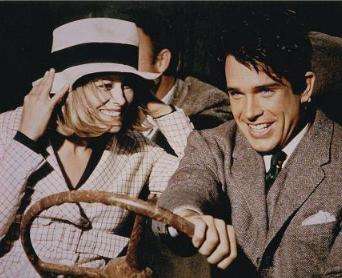Bonnie and Clyde

"This here's Miss Bonnie Parker. I'm Clyde Barrow. We rob banks."
Bonnie and Clyde is a 1967 biopic about the famous bank-robbing duo of Bonnie Parker and Clyde Barrow, played by Faye Dunaway and Warren Beatty. Dunaway's Bonnie is a bored waitress who goes off with small-time crook Clyde on a lark. Bonnie and Clyde graduate to bank-robbing and murder after being joined by Clyde's brother Buck (Gene Hackman), Buck's wife Blanche, and gas-station attendant C.W. Moss. The Barrow Gang becomes infamous. They capture, humiliate, and release a Texas Ranger, Frank Hamer, who swears vengeance.
The Barrow Gang is caught in a shootout from which Bonnie and Clyde escape, but Buck is killed and Blanche is blinded and captured. Hamer tricks Blanche into revealing the location of Moss, who is hiding out with his father. Daddy Moss, who hates Bonnie and Clyde for luring his son into crime, makes a deal with Hamer to lay an ambush for Bonnie and Clyde. Hamer fakes a flat tire by the roadside, and when Bonnie and Clyde stop to help, they are killed in a fusillade of bullets.
Bonnie and Clyde was a smash hit that made huge stars out of Beatty and Dunaway. It was nominated for ten Oscars and won two, for Best Supporting Actress (Estelle Parsons as Blanche) and Best Cinematography. It is regarded as part of the first wave of the New Hollywood movement that helped to break down the studio system and usher in a creative rebirth for Hollywood, with its increased sex and violence, glorification of anti-heroes, and skepticism of authority.
- Action Girl: Bonnie.
- Adaptational Attractiveness: Plain-faced Bonnie Parker and shrimpy little Clyde Barrow, played by foxy Faye Dunaway and Warren Beatty.
- Inverted Trope with Blanche and Buck Barrow. The actors in the film are considerably dumper looking than there real life counterparts.
- Affably Evil: Don't you like Bonnie and Clyde?
- All Girls Want Bad Boys: After the first time he holds up a store with her, Bonnie immediately tries to jump Clyde's bones.
- Anti-Hero: Clyde is a thief and murderer.
- Asshole Victim: They rob banks, which after seeing what the banks have done to the poor folks of the country by foreclosing on their property, makes them look not as bad after all.
- Bang Bang BANG
- Bank Robbery
- Bounty Hunter: The gang believe Frank Hamar to be one.
- Composite Character: C.W. Moss is a composite of two members of the Barrow Gang, W.D. Jones and Henry Methvin.
- Cool People Rebel Against Authority
- Damn, It Feels Good to Be a Gangster!
- Downer Ending: A Foregone Conclusion.
- Eye Scream: Blanche gets shot in the eye and later ends up blind in a hospital.
- Follow the Leader: The film's success inspired a few exploitation films about '30s gangsters, such as A Bullet For Pretty Boy (former teen idol Fabian Forte as Pretty Boy Floyd) and Bloody Mama (Shelley Winters as Ma Barker, directed by Roger Corman).
- Gorn: For its time (right after the removal of the Hays Code), this was a very violent movie.
- The Great Depression: The backdrop for the film, and as Clyde believes, the main reason for the gangs vocation.
- Gun in My Pocket
- Hobos: The gang meets up with a camp of them after a shoot out and ask for water, they get a lot of attention and are given soup as well as water.
- Hollywood History: C.W. Moss is a composite of two characters and other gang members are omitted. The nasty car accident that left Bonnie with a permanently lame leg is not in the film. Frank Hamer was not kidnapped and embarrassed by the Barrow Gang; rather he was lured out of retirement to hunt them down. Clyde died in the car with Bonnie, instead of getting out as we see in the film.
- The real-life Bonnie and Clyde were nowhere near as sympathetic as this movie portrays them. Newspaper columnist Mike Royko, shortly after the film came out, printed a number of angry letters from relatives of the gang's real-life victims offended by their romanticization. One read in part, "They got my father. They did him with machine guns. He lived for three days."
- The Lancer: Buck.
- The Loins Sleep Tonight: "I ain't much of a loverboy."
- Moral Myopia: The gang don't think they're doing anything particularly wrong, but those jerks who try to stop them from robbing banks, they were totally asking to be shot. (Of course, some of their enemies are jerks, but it isn't trying to stop murderous robbers that makes them so.)
- More Dakka: How the title characters went down, in the movie and in RL. Those two had killed at least nine police officers over the course of their career, so the cops weren't taking any chances.
- Name and Name
- New Hollywood: One of the first movies of this era.
- Outlaw Couple
- Present Day Past: The writers and director deliberately downplayed period accuracy to make the film more of a commentary on the '60s. The world of the movie is partly inspired by the '30s and partly by the movies of the French New Wave.
- Screaming Woman: Blanche, much to the chagrin of the rest of the gang (especially Bonnie), as well as to her real-life inspiration.
- Spiteful Spit: After Bonnie kisses Hamer for the posed photo, he spits in her face.
- There Is No Kill Like Overkill: Wow. Truth in Television, too.
- Villain Protagonist
- Working on the Chain Gang: Clyde chopped off two of his toes to avoid this.